Afghanistan War, CIA Sponsored Terror, Civil Liberties, Habeas Corpus, Human Rights, Iraq War, Surveillance, Targeting Muslims, Torture, Truth to Power
Podcast: Play in new window | Download
Updates:
—


“Operation Libya” and the Battle for Oil: Redrawing the Map of Africa
The US and allied air strikes on Libya will have far reaching geopolitical and economic implications. Libya is the among the world’s largest oil economies with near 3.5 percent of global oil reserves, twice that of the United States. What’s going here? As Professor Michel Chossudovsky writes in his article “Operation Libya” and the Battle for Oil: Redrawing the Map of Africa.” there is no such thing as a just war. This is part of US imperialism as drafted in the 2000 Report of the Project of the New American Century entitled “Rebuilding Americas’ Defenses.” One of the main components of this military agenda is: to “Fight and decisively win in multiple, simultaneous theater wars”. Libya counts as the fourth theater of war along with Palestine, Afghanistan, Iraq. In all of this the mainstream media has used a massive disinformation in justifying this military agenda.
Professor Michel Chossudovsky:
- This is not a humanitarian intervention. It is a carefully planned military operation. This was on the drawing board of the Pentagon, well before the protest movements in Egypt.
- It is a war theater, and should be viewed in the broader context of the war theater, namely Iraq, Afghanistan and Palestine. It opens up a new area of militarization in North Africa. It has devastating consequences and is part of a global war.
- The object of coming to the rescue of civilians by bombing with cruise missiles is an absurd proposition. They’re bombing civilian infrastructure. The same agenda as the previous war theaters, they have a list of targets and go ahead and bomb. This whole notion of responsibility to protect is nonsense.
- They’re getting away with it because the media is lying through their teeth.
- Clearly there are Al-Qaeda elements that are supported by the CIA. Two years ago, the Gaddafi government made a deal with the CIA. We know that Al-Qaeda is an intelligence asset. It can be used precisely to create these conditions of insurrection as occurred in Bosnia and in Kosovo. We have to investigate a little more, who is behind the insurgency. The insurgency is not there to win a civil war, the insurgency is there to create a pretext for an intervention.
- I suspect this opposition is heavily divided in any event. Obama has ordered drone attacks in Pakistan.
- The Chinese have sizable interests in Libya. This is also directed against France and Italy, its France and Belgium that are being shoved out of Central Africa.
- Libya borders on Niger, its the entry into central Africa. Niger is important because it has large reserves of Uranium, which is in the hands of a French conglomerate.
- The conquest of Libya is the battle for oil, the same logic as Iraq.
- I estimated that Muslim countries have about 65-75 percent of global oil reserves. That is why we’re demonizing Muslims, they happen to inhabit.
- Bahrain and Yemen peaceful protesters getting hit with nerve gas.
Guest – Professor Michel Chossudovsky, director of Global Research.ca , Center for Research on Globalization. An independent research and media organization based in Montreal, Quebec, Canada.
————-
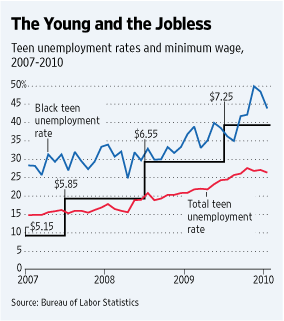
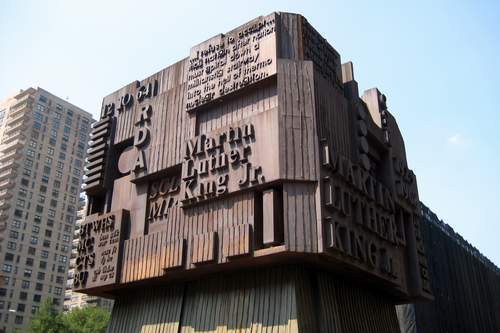
Community Service Society Report: Black Youth Unemployment
Unemployment in a jobless economic recovery has hit young African American men the hardest according to a recent report by the Community Service Society. PDF The highest unemployment rate in 2009 was among men 16-24 years of age—their overall unemployment rate hit 24.6 percent during the recession. Breaking it down by race, young black men had the highest unemployment rate in this group at 33.5 percent. While only one in four black men ages 16-24 have a job in the city, that figure drops to an astounding one in ten for young black men without a high school diploma.
“The recession has created a landscape of the unemployed and underemployed with particular catastrophic consequences for young African American men,” said David R. Jones, president and CEO of the Community Service Society of New York. “We have long known the struggles of the more than 200,000 youth in New York City who are out of work and out of school. Now young black men between 16 and 24 years have become the banner of hopelessness, particularly here in New York City.”
David R. Jones:
- Those who’ve never made the connection to work or those who’ve ceased trying. We’re talking hundreds of thousands of people involved here. African Americans constitute about a third of New Yorkers.
- I think people have to recognize we’re in something totally new.
- At least anecdotally, the Great Depression didn’t have this kind of impact on the black community that this recession is having on them.
- New York in the Great Depression was a segregated city, were working exclusively in black communities or trades that were circumscribed.
- You get pullman porters and restaurant work which were the reserves for African Americans before the civil rights movement hit. The homeless of New York were white on Bowery.
- While we’re seeing a better recovery, the number of long term unemployed is actually greater than New York than other municipalities.
- The trouble is you start to lose job skills, you lose hope, all sorts of with friends and employment start to disintegrate.
- We did a report on security guards and I went back to look at it. There are 63 thousand security guards in the city of New York and virtually none of them are unionized, their average wage was $10 an hour, no health insurance, no paid sick leave.
- New York has an usually high concentration of the working poor.
- We’ve been focusing all our efforts, in terms of how we deal with poverty on the issue of on this nexus between work and getting to a position where they can support themselves and their families.
- This is not limited to the South Bronx or Crown Heights, this is a national phenomenon.
- We know when we did our report on disconnected youth, we had 200 thousand disconnected youth in New York, there were nearly 5 million disconnected youth scattered across the country before the recession.
- We’re never going to go back, to the unemployment levels that we found unacceptable in New York of 5% again. That we’re going to back down from the 9.5 %.
- It was always the expectation, if you worked really hard, there’s was going to be a way, sort of a seat at the table here. New York has one of the highest recidivism rates, we’re doing a couple of things, we’re making it impossible to get work, once you’ve been incarcerated.
- We are going to get a group of young people who feel betrayed.
- I think this scapegoating that has taken on a really powerful voice, is partially because people want to blame someone for why they can’t get employment.
Guest – David Jones, President and Chief Executive Officer of the Community Service Society of New York , a nonpartisan, not-for-profit organization that promotes economic advancement and full civic participation for low-income New Yorkers.
Mr. Jones, an outspoken advocate for low-income New Yorkers, writes bi-weekly newspaper columns in the New York Amsterdam News and El Diario/La Prensa and a weekly blog on the Huffington Post website that serve to educate the public and government officials on issues of importance to minority and poor communities.
——————————-
Civil Liberties, Criminalizing Dissent, FBI Intrusion, Guantanamo, Habeas Corpus, Human Rights, Political Prisoner, Surveillance, Targeting Muslims, Torture, Truth to Power
Podcast: Play in new window | Download
Updates:
————-
In Memory:
The remarkable and heroic progressive lawyer Len Weinglass died on March 23. Among his cases were the Chicago 8, the Ellsberg case and the Cuban 5. Listen to the 4 interviews Law and Disorder did with him over the last 4 years. He was our close comrade and will be missed by his friends and all those seeking a better world. – Michael Ratner.
————-
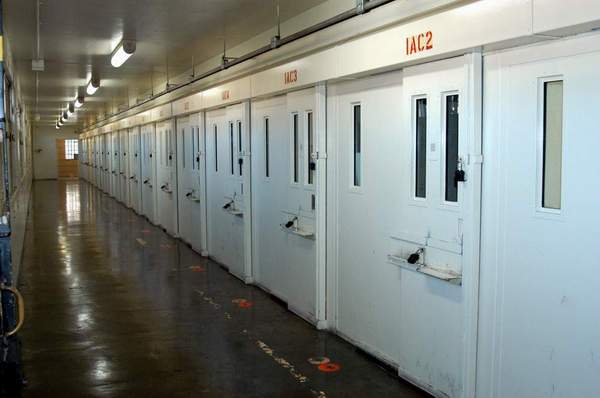
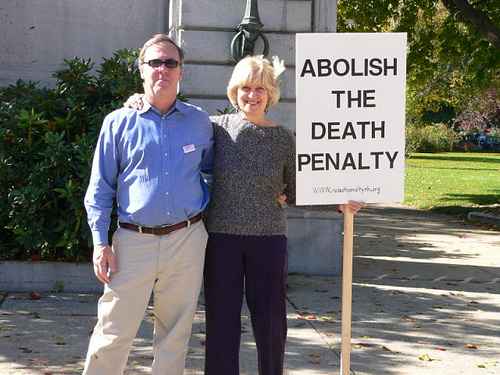
Death Penalty Abolished In Illinois
Last week, Governor Pat Quinn of Illinois signed into law SB3539, which repeals the death penalty in that state. This development is yet another in what appears to be signal a trend of moving away from capital punishment. Early last year we covered the American Law Institute’s declaration that the death penalty in this country has been a failure. Listeners may recall that the A.L.I. created the intellectual framework and justification for the current capital justice system. The movement away from this most final form of punishment seems to be due in large part to the public’s increased awareness about its inherent flaws such as great racial disparity on who gets executed and for what reason. Publicity around exonerations stemming from DNA evidence has also added to general awareness of procedural errors in the system.
Attorney Charles Hoffman:
- In 2003, Governor Ryan cleared out death row, he granted to the 167 men and women on death row and pardoned four.
- that prompted the legislature to pass a modicum of reform. The governor afterward assembled a commission that recommended 85 reforms.
- The legislature passed five or six. The legislature also created a death penalty reform study commission.
- One of the reforms was that all confessions in police custody had to be videotaped in murder cases.
- No matter what safeguards you implement, there’s no system that can prevent the conviction and condemning of an innocent person.
- Prosecutors around the state were asking for the death penalty in cases that weren’t death penalty prosecutions just so the state would bear the costs rather than the county.
- The legislature is cash-strapped and we were wasting millions and millions of dollars prosecuting capital cases when here in Illinois we have the very strict alternative of life without parole.
- Final Report: Death Penalty Legislative Study Committee. Illinois Death Penalty Reform Study Commission PDF
- After Governor Ryan cleared out death row in 2003, Illinois put 17 men on death row. 2 had committed suicide, which left 15 on death row when Governor Quinn signed the abolition bill and also granted sentence commutation to all 15. He commuted their death sentences to life without parole.
- As the problems with the death penalty have been exposed, the arbitrariness, the racism, as mistakes have gone into public consciousness, juries have been rejecting the death penalty.
- Illinois has become the 16th state to abolish the death penalty, following on the heels of New Mexico, New Jersey and New York. The federal government and the military do have it.
- The “deathbelt” in this country is in the South and Texas, and is just a legacy of slavery in this country.
- Most executions occur in former slave states. One obvious flaw of the death penalty, studies have shown the death penalty is most likely to be inflicted in a case when the victim is white and the odds go up even further if the defendant is black or Hispanic.
- Its very gratifying to get rid of this barbaric practice. I represented 35 men and women who were sentenced to death. I do the direct appeals. I’ve had one client executed, I’ve had one client go home.
- Some states have made illegal purchases of the drug. (lethal injection drug shortage)
- Some states are using just one drug, a massive overdose of a barbiturate.
- Life without parole is very draconian, it means there’s no prospect for rehabilitation.
Guest – Assistant Defender in the Supreme Court Unit at the Office of the State Appellate Defender, and member of the board of directors of the Illinois Coalition to Abolish the Death Penalty.
———


Communities Battle Against Gas Drilling To Protect Water, Way of Life
Environmental community groups from New York, New Jersey and Pennsylvania continue to band together and try to protect the Marcellus Shale watershed from natural gas drilling and hydraulic fracturing. The EPA has stated it will investigate how hydraulic fracturing impacts water supplies and water quality in New York State yet the drilling moratorium ends this June. The shale is believed to hold some of the world’s largest deposits of natural gas, and those that want to mine this resource say it will reduce dependence on foreign oil and boost the economy. However, many have shown this statement to be false as the natural gas from the United States is being sold to foreign countries such as Norway and France.
Ninety percent of the New York City’s drinking water comes from ground zero of where various oil companies want to drill into the Marcelle Shale for natural gas. Environmental and public health costs are enormous for each well. Every time a well is drilled, the companies use an estimate of 5 to 9 million gallons of water. Each time a well is fractured, it’s another 5-9 million gallons of water, a well can be fractured multiple times. Up to 275 different toxic chemicals are used in the process and after the well is drilled, there are millions of gallons of industrial waste, it’s essentially radioactive water. 40-70 percent of this water stays underground. The hydro-fracturing process has no federal regulating body. Some of the companies involved are Halliburton, Chesapeake Energy, Fortuna, and Talisman Hess.
Tracy Carluccio:
- My organization has been working on the issue for a few years to try to keep gas drilling from moving ahead.
- Right now there is a moratorium in place on the Delaware River Watershed. It took a year and a half to get that into place. Regulatory measures that are in place now for gas drilling are not doing their job.
- The bottom line is we’re facing an industry that wants to move ahead.
- The industry is very strong. There are international concerns.
- They’re backed by the government in many ways, they enjoy subsidies.
- This industry is going to move like heck to drill everyplace gas can be gotten.
- The Delaware River Watershed has its origins in the Catskill region of New York State.
- The east and west branches come together in Hancock, New York.
- 330 miles from Hancock to the Atlantic Ocean.
- The watershed is 13 thousand square miles and includes four states. It’s overseen by an agency that was born out of water wars.
- Back in the 1950s, all the states were suing each other about who would get water for development.
- In 1961, there was a Supreme Court decree and compact and President Kennedy signed a document that began the Delaware River Basin Commission. As a result of this compact, a large part of the Delaware River goes to New York City.
- There have been regulations federally (Represented by the Army Corp of Engineers) and regionally laid out by the Delaware River Basin Commission
- New York moratorium on gas drilling is tied to late June when there is supposed to be a new draft of the Draft Supplemental Generic Environmental Impact Statement on high volume hydraulic fracturing.
- In order to crack the rock to get at the gas is intrinsically polluting and there’s no way out of that.
- The question of how to stop it is tied to the scientific analysis free from bias.
- Without that bottom up movement, without that cry for government regulators, the industry would be moving ahead exactly as planned.
Guest – Tracy Carluccio, deputy director with Delaware Riverkeeper Network. Delaware Riverkeeper – a watershed wide advocacy program, Delaware Riverkeeper Network takes a strong stance on regional and local issues that threaten water quality and the ecosystems of the Delaware River and its watershed. In fact, Delaware Riverkeeper Network is the only advocacy organization working throughout the entire Delaware River Watershed.
—–
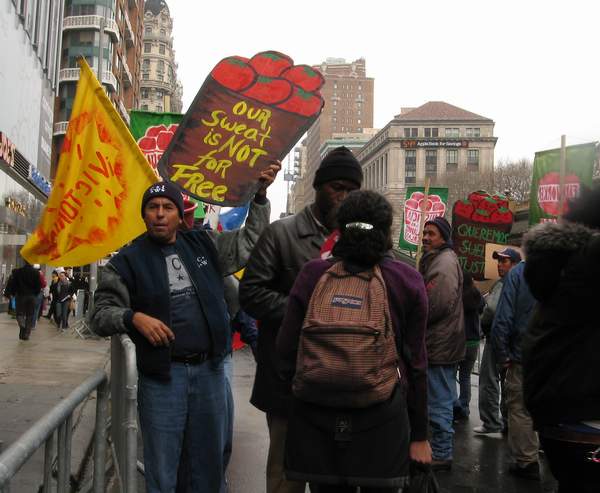
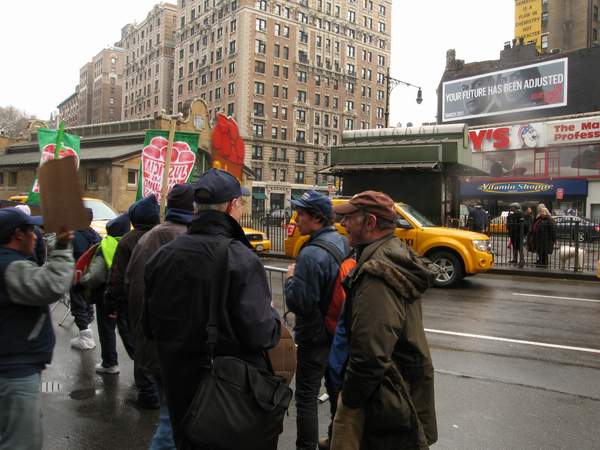
Farmworkers, Consumers Protest Trader Joe’s Demanding Fair Labor Standards for Farmworkers
Late last month, a busload of farm workers from Florida joined members of the NYC Community Farm worker Alliance at Trader Joe’s Upper West Side store. Men and women who pick tomatoes under very harsh conditions demand to be treated more humanely and with improved farm labor wages. Our own Michael Ratner was at the demonstration, we hear some of the interviews.
———————————————————————-
Civil Liberties, Criminalizing Dissent, FBI Intrusion, Guantanamo, Habeas Corpus, Human Rights, Prison Industry, Supreme Court, Targeting Muslims, Torture, Truth to Power
Podcast: Play in new window | Download
Updates:
—
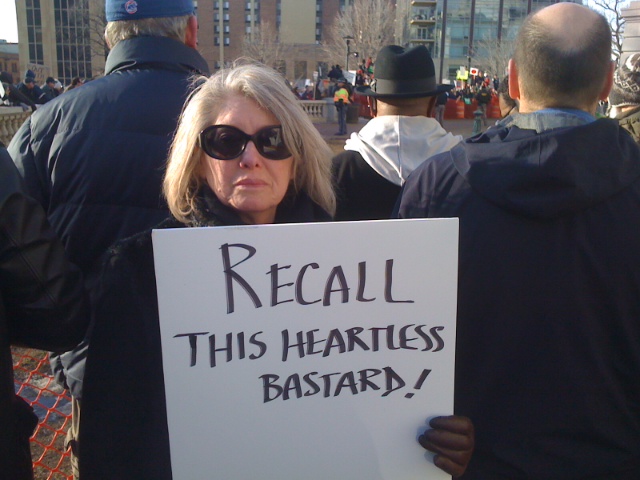

Wisconsin Labor Demonstrations Update
Organized labor is in the cross-hairs to be taken apart by the American elite. Last month, 10 thousand people continued a multi- day occupation of the Wisconsin State Capitol building while tens of thousands chanted outside. Meanwhile the country is gripped by the drama unfolding in Wisconsin and it has inspired unions in other states to move in solidarity. Among those states are Montana, Indiana, Ohio, Michigan, Pennsylvania and New Jersey. Listeners may remember that Wisconsin trade unions have already conceded to wage and benefit cuts. Now the state is voting to repeal Section 11170, the Public Employee Bargaining Chapter. Update: Wisconsin GOP Allows State To Fire Employees For Strikes, Walkouts
Attorney Lester Pines:
- Governor Walker is clearly a stocking horse for the far right wing of the Republican Party.
- I’m not surprised at his behavior, he behaved this way as a Milwaukee County executive.
- I told people he was going to try to repeal section 11170 which is the Public Employee Bargaining Chapter
- What’s at stake is an attempt by the governor and the legislature to strike at the heart of the Wisconsin tradition of organized labor.
- Public employee bargaining has been in Wisconsin for 50 years. This is an attempt to tear apart generations of how Wisconsin operated.
- On a federal level, this is an attempt to wipe away outside groups that democratic and progressive candidates.
- Wisconsin has a bi-annual budget. The legislation is part of budget repair bill. In that legislation is a bill to eliminate all collective bargaining for all municipal and school district employees as well as for state employees.
- There will be no bargaining if this bill passes. The only thing that can be bargained with is wages.
- The bill also imposes a cap on wages. These are designed to essentially make it impossible for public employee unions to function in any meaningful way.
- Scott Walker didn’t talk about what he would actually do.
- If we look at the mass demonstrations in Madison. These are the biggest demonstrations I’ve ever seen here.
- Impeachment is impossible because Republicans control the legislature and Senate, however he can be recalled.
- The Democrats can’t be arrested in a criminal sense,
- Governor Scott Walker has reignited the progressive movement in Wisconsin.
- Until you get these Republicans out of office they’re going to do a lot of damage. They’re nihilists. They care nothing for public services. They care only for what their corporate puppeteers want them to do.
- It looks like this whole anti-public union movement was actually planned out amongst all these new governors.
Guest – Labor attorney Lester Pines, in practice since 1975, he leads the Litigation area, concentrating in civil trials, criminal defense, labor & employment, and business. A Fellow in the American College of Trial Lawyers, Mr. Pines is a highly respected civil and criminal litigator who has appeared in courts throughout Wisconsin and litigated federal matters in Wisconsin, Illinois, Iowa, Ohio and New York.
————————–
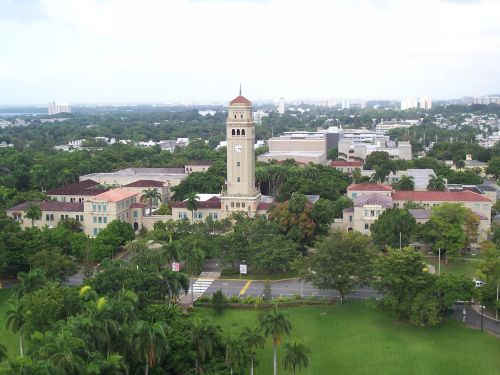

Human Rights Crisis Continues In Puerto Rico
More than a year ago nearly 100 thousand people took to the streets of San Juan, Puerto Rico to protest the lay off of about 17 thousand public employees. The demonstration shut down all state-owned enterprises including the island’s schools and colleges. Two days before that strike the governor passed a bill aimed at dismantling the Bar Association. Protesters were warned that if they stopped commerce, particularly the docks and airports, that action would be sanctionable to federal law. Now, as human rights violations continue, as students and faculty demonstrate against dismantling of progressive curriculum and tuition hikes. ACLU of Puerto Rico, “Human Rights Crisis in Puerto Rico: First Amendment Under Siege.” Law and Disorder Interview with Judy Berkan October 2009
Attorney Judy Berkan:
- Wholesale attack on institutions of Puerto Rican society where any dissent could be lodged.
- The Puerto Rican Bar Association, a real forum for those without a voice. Attacks have come to the Bar Association, elimination of mandatory Bar membership and imposed draconian restrictions upon the Bar Association. They took away a great deal of our funding.
- The president of the Puerto Rican Bar Association was jailed for speaking out against a lawsuit that could take away life insurance from poor lawyers.
- There’s a one month prohibition on leafleting and expression in the University of Puerto Rico.
- The closing of the legislative chambers. Right now there is a US Department of Justice investigation and talk of a trusteeship of the police department here.
- The use of the tactical operations of the police to repress dissent has been intensified.
- All of our public spaces are being closed off to legitimate dissent, while people engaged in peaceful dissent are being attacked.
- Austerity: Part of the remedy of the economic crisis there was an increase in tuition of 800.00. But much more at stake.
- More than that there is question of the vision the University of Puerto Rico will take in the future.
- The emphasis appears to be on privatization as it is throughout the government. We been suffering these programs since 2009.
- We were the guinea pigs. There’s more violence here, if we occupied the state house here, we would’ve been met with pepper spray, gas and beatings as we were when we attempted to demonstrate outside the state house last June.
- The economic programs are really the model that’s being used by Republican governors in the US
- The University situation is really wallowing in the wind without a real solution.
- The Bar Association and their presence is very crucial to public debate in Puerto Rico.
- I think people are getting tired, we do have 2 more years left of this administration.
- The police department is still in the hands of a former FBI agent who has openly encouraged violence against protesters. We have a raging crime rate.
- What’s distressing for all of us here who care about these matters is the media black out in the United States.
- Are we training people to be managers at McDonald’s or are we training people to think about the future of Puerto Rico?
Guest – Attorney Judith Berkan, is a partner in the San Juan law firm of Berkan/Mendez. She specializes in government misconduct litigation and employment discrimination cases. Berkan worked as an attorney in New Haven, Connecticut before going to Puerto Rico as the staff attorney for the Puerto Rico Legal Project of the National Lawyers Guild, now the Puerto Rico Civil Rights Institute. For twenty-seven years, she has been teaching, primarily in the Constitutional Law area, at the Inter American University Law School in San Juan, Puerto Rico.
A frequent speaker and author of many articles on civil rights issues, she was the President of the Human Rights Commission of the Puerto Rico Bar Association in the mid-1990?s and a member of the Commonwealth Supreme Court’s task force on gender discrimination.
————————–

Left Forum 2011
The 2011 Left Forum convenes this Spring, March the 18 to the 20th. This is the largest annual conference of a broad spectrum of left and progressive intellectuals, activists, academics, organizations and the interested public. Conference participants come together to engage a wide range of critical perspectives on the world, to discuss differences, commonalities, and alternatives to current predicaments, and to share ideas for understanding and transforming the world.
Guest – Stanley Aronowitz Distinguished Professor of Sociology at CUNY Graduate Center, where he is Director of The Center for the Study of Culture, Technology and Work. He has taught at Staten Island Community College, University of California-Irvine, University of Paris, Columbia University, and University of Wisconsin.
——————————————————————————————–
Civil Liberties, Criminalizing Dissent, FBI Intrusion, Habeas Corpus, Human Rights, Torture, Truth to Power
Podcast: Play in new window | Download
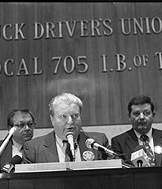
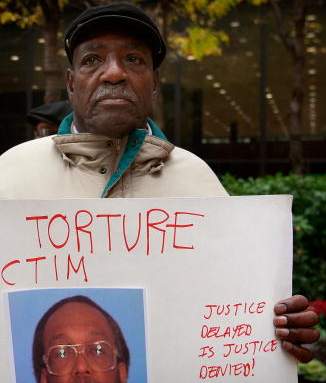

Jon Burge, Former Chicago Police Commander Sentenced to 4 ½ Years
Here on Law and Disorder we’ve reported on the ongoing developments of the Chicago Torture case and former Chicago police commander Jon Burge. Burge has been sentenced to 4 and a half years in prison for obstruction of justice and lying about torturing prisoners to obtain coerced confessions. The People’s Law Office brought the case in 2005 and the city of Chicago refused to settle while pumping hundreds of thousands of dollars into the case. Attorney with the People’s Law Office Flint Taylor says the city has spent over the 10 million dollars in aiding the defense of former Commander Jon Burge. Mr. Burge, who is 63 and in ill health, was fired from the Chicago Police Department in 1993. Attorney Flint Taylor’s Statement on Burge sentencing.
Attorney Flint Taylor:
- Burge did not do this alone. Many people working under him or with him, those people are under investigation.
- The city pours millions of dollars into the defense of Burge with private lawyers.
- There needs to compensation and treatment for all the men that were tortured that number is in the hundreds.
- We have a mayoral race here, with 3 Daley clones, none of them have addressed what the judge has said.
- The judge cited the city and the police department as well as the state’s attorneys office under Richard Daley has a dismal failure of leadership with regard to these cases.
- To be in the court room and hear a judge adopt our view that we fought so hard for, that was very rewarding.
- People look at the sentence, it’s a little less than five years, of course you should do much more than that for torture. The judge had her hands tied in some degree and she went as high as she could, going double on the guidelines that were recommended.
- We’ve been raising for decades why Richard Daley didn’t prosecute for torture when he was states attorney.
- The Obama Administration’s failure or refusal to prosecute admitted torturers, I’m talking about Bush who in his book admitted that he authorized water boarding.
- Chicago is a beacon of light in the fight against torture.
- We fought for decades here to get the prosecutions, to get the convictions, to get the sentence.
Guest – Attorney Flint Taylor, a graduate of Brown University and Northwestern University School of Law and a founding partner of the Peoples Law Office. More bio
—-
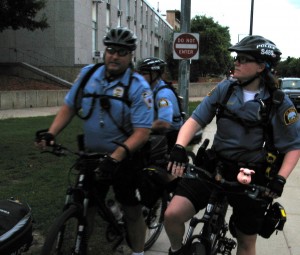

State of Democratic Rights – Bill Goodman
We’re joined today by attorney Bill Goodman former legal director for the Center for Constitutional Rights. Bill has been an extraordinary public interest lawyer for more than 30 years he’s served as counsel on issues including post-Katrina social justice, public housing, voting rights, the death penalty, living wage and human rights work in Haiti. Bill delivered a speech recently titled the State of Democratic Rights, defining democracy as we now understand it. Everyone of these defining points has been attacked or undermined and very little has been done to repair them under the Obama Administration.
Attorney Bill Goodman:
- If you want to define or crystallize what American democracy looks like in maybe 7 concepts you can break down pretty well.
- People can’t be detained without good cause and without being charged with a crime in front of an independent magistrate.
- They can’t be tortured or punished in ways that are extreme.
- They’re allowed to protest publicly. First Amendment rights.
- People can’t be discriminated against based upon religion.
- Separation of powers, so that no single branch of government becomes overly important or overreaches.
- Right to privacy. The government can’t break into our houses, unreasonable search and seizure.
- The right to free and fair elections and have our votes counted.
- From a lawyers perspective, what I see is an unwillingness of the courts.
- It’s shameful that these judges don’t step up to the plate and say that this should not happen and will not happen.
- Humanitarian Law v. Holder. There’s a very serious attempt to extend the concepts of terrorism to protesters right here in the United States.
- People who work on behalf of the environment, animal rights.
- The United States Supreme Court is happy to say that huge corporations can spend as much money as they possibly want to shift and tilt the electoral playing field right here in the United States.
- In order to strengthen the Constitution we need active aggressive organized movements.
- Within the end of a generation we can see the end of public education in the United States.
Guest – Bill Goodman, former legal director for the Center for Constitutional Rights has been an extraordinary public interest lawyer for over 30 years, and has served as counsel on issues including post-Katrina social justice, public housing, voting rights, the death penalty, living wage, civil liberties, educational reform, constitutional rights, human rights work in Haiti, and civil disobedience.
—
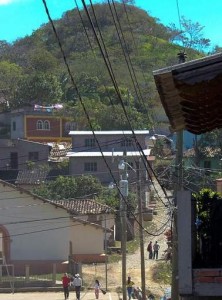
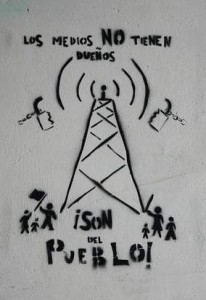
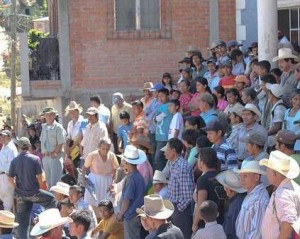
Post Coup Aftermath – Honduras: Sarah Hogarth
Today we are joined by legal worker Sarah Hogarth who has recently returned from a human rights delegation to Honduras through the Friendship Office of the Americas. We talk with her about her observations on the post coup human rights crisis in that country. As listeners may know On June 28, 2009, the Honduran military ousted the democratically elected President Manuel Zelaya. Former Parliamentary speaker Roberto Micheletti was sworn in as Zelaya’s replacement. Repressive tactics were used immediately after the coup–people on the front lines who oppose this regime have been beaten and illegally detained by the state. Journalists and LGBT activists were among the first to be targeted and killed. Dr James Cockcroft joins interview.
Sarah Hogarth/ James Cockcroft:
- The purpose was to meet with the movement leaders and the human rights organizations there.
- Honduras elections broadly considered to be illegitimate. The president who was overthrown, brought Honduras into ALBA.
- The outgoing president was flown out of a US military base in Honduras. The whole world knew this, but the United States said it wasn’t a coup. Now wikileaks shows that the ambassador was already telling Washington, it’s a coup.
- Zelaya was not the most radical of political leaders by any stretch.
- The resistance movement there is truly an inspiration. The new Honduran regime has instituted anti-terrorism legislation.
- The community radio movement in Honduras is the primary means, to disseminate real news about what’s happening.
- There was a time after the coup the radio equipment was not only shut down by the military but the equipment destroyed.
- Withing 48 hours, community radio stations from other Latin American countries rushed to the borders of Honduras to keep communications going into Honduras among the resistors.
- The people want the money flow to stop funding the new regime.
- Six thousand Marines were just sent to Costa Rica. Two military bases in Honduras, 6 in Columbia.
- The whole foreign policy of the United States has been and extension of the Bush policy of militarization of the world.
- This is being pitched in the context of the war on drugs. Disguise the imperial intervention with the war on drugs.
- There is an extremely small amount of arable land in Honduras.
- The level of unity among all these people is truly impressive.
- Another thing that is discouraging is the extreme privatization that has happened over the past year.
- They have given away the farm to these large corporations.
Guest – Sarah Hogarth, human rights activist in New York City. She is a freelance legal worker and writer and has recently returned from a human rights delegation to Honduras through the Friendship Office of the Americas. The delegation met with activists to learn about the human rights situation in Honduras in the one year since the elections in November 2009. In June 2009, democratically elected President of Honduras, Manuel Zelaya, was removed in a military coup d’etat.
Guest – Dr. James Cockcroft, historian and activist, Jim has written 45 books on Latin America. He’s a professor at the State University of New York and is a member of the International Committee for the Freedom of the Cuban Five.
—————————–
Civil Liberties, Criminalizing Dissent, FBI Intrusion, Habeas Corpus, Human Rights, Surveillance, Targeting Muslims, Truth to Power, War Resister
Podcast: Play in new window | Download
Updates:
—-
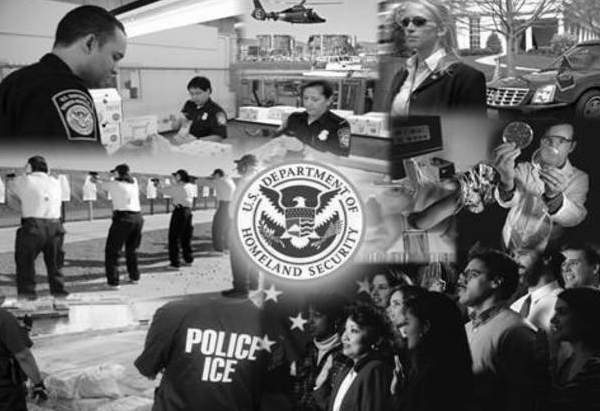
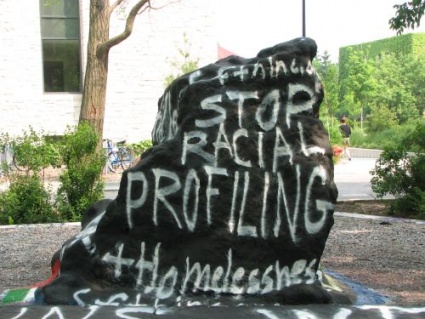
Right-Wing Firms Train Public Servants on Terror Threats
There is a sprawling hidden world of counter-terrorism organizations growing beyond control in the United States. Twenty-four of them were created by the end of 2001, including the Office of Homeland Security and the Foreign Terrorist Asset Tracking Task Force. The next year, 37 more were created to track weapons of mass destruction and collect threat tips. By 2009, nearly 260 organizations were created as 854 thousand civil servants, military personnel and private contractors with top-secret security clearances monitor national security concerns. However, according to a report from the Public Research Associates, those same concerns have bolstered a class of self-proclaimed terrorism experts who decry Islam as an evil religion of terrorists and routinely brand Muslims as primitive, vengeful, duplicitous, and belligerent people who oppress women and gays, and have values irreconcilable with “western Judeo-Christian civilization.”
In fact, when PRA discovered earlier this year that the Massachusetts Bay Transportation Authority (MBTA) had contracted with Security Solutions International to conduct a training on radical Islam, they notified the Muslim American Society, ACLU, and our other advocacy partners, who used PRA’s research to compel the MBTA to cancel the agency’s training.
Chip Berlet :
- As part of the Homeland Security Initiatives and working with the FBI in other aspects of the national security apparatus, there was a need to train thousands as part of a local state and federal counter-terrorism “experts.”
- Some of these trainings are quite good. The problem is that there are a handful of groups that train hundreds and hundreds of local, state and federal counter-terrorism experts, with rhetoric that is basically Islamophobic.
- In the late 1970s there was an attempt to restrain this illegal surveillance. I’d have to say right now it’s worse.
- What used to be done illegally and covertly is now done ostensibly legally and openly and in fact proudly by both Democrats and Republicans who should be ashamed.
- The whole strategic suspicious reporting initiative which basically is a pipeline for unverified rumor and innuendo through local police departments up through a chain of information agencies to the federal government. We know in Europe this kind of reporting is unconstitutional and bad for society.
- Now, everyone that was considered illegal and unconstitutional for which there were Congressional hearings and reforms under Jimmy Carter, now we do it.
- In proper training that is actually looking for criminal activity, not people of color who wear garb that we’re scared of. What’s going on here is untrained, badly trained officers are reporting the names of people up into a huge infrastructure of information data storage, based on bias they’ve not been trained to resist or confront within themselves.
- We described this whole process as a platform for prejudice in a report by Tom Cincotta
- Tom has on his wall a wall chart of all the agencies of this information reporting system and it has 150 dots so inter-connected, no one can control this.
- I’m urging people to form broad coalitions across the political spectrum.
Guest – Chip Berlet, (senior analyst) is a veteran freelance writer and photographer who specializes in investigating right-wing social movements, apocalyptic scapegoating and conspiracism, and authoritarianism. A PRA staffer since 1982, he has written, edited and co-authored numerous articles on right-wing activity and government repression for publications as varied as the Boston Globe, the New York Times, The Progressive, The Nation, The Humanist, and the St. Louis Journalism Review.
—
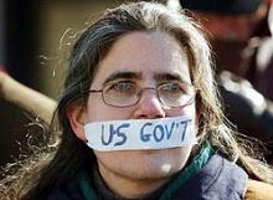

Lawyers You’ll Like – Sally Frank
For our Lawyers You’ll Like series, we’re delighted to have with us attorney, activist and Drake University law professor Sally Frank. Sally specializes in family law and domestic violence. Her activism began when she was a student at Princeton University. She filed suit against the Cottage Club, the Ivy Club and the Tiger Inn because they refused to admit her as a member based on gender. 13 years later she won the case and the three eating clubs became coed. Now Sally Frank lectures on women in law and encourages law students to be activists.
Attorney Sally Frank:
- They (Princeton) had 13 eating clubs and 3 of them were all male.
- I sued three of the clubs and the University, it began when I was a 19 year old junior at Princeton in 1979.
- My problem with it was they were very important institutions on campus, they ratified discrimination. A couple of them were the most prestigious clubs, if the most prestigious people discriminated, that kinda made it ok and it radiated it back onto to the campus in other aspects of life.
- The question was whether they were public accommodations or not.
- When I was in 5th grade I watched Inherit The Wind five times.
- Seeing William Kunstler and the Chicago 8 and how he supported the protesters and the rights of the people, and how Clarence Darrow did, made me want to be a people’s lawyer. Clerk for Emily Goodman as first job out of law school. I learned so much from her, I learned how to make a record.
- The Joint Terrorism Task Force began to investigate the peace movement in Des Moines, Iowa.
- There was question that my email was being watched. They subpoenaed 4 peace activists to a grand jury. Drake University was subpoenaed for information on the National Lawyers Guild members.
- After I found out about the Drake subpoena, there was a gag order on the subpoena.
- Leading up to 2008 RNC in Minneapolis, FBI leaving cards with peace activists in Iowa. What was going on here was an intelligence gathering that we were able to stop.
- Do not talk to the FBI, NSA, ICE. It’s very hard for people who were brought up to be polite, not to answer a question.
- We lived in a condo on the 8th floor and Bush came to the senior citizens center next door. We unfurled a banner from the balcony, a half hour before Bush was expected and we got a knock on the door by the secret service.
- I checked with the ACLU and they couldn’t bust in. Exigent circumstances.
- Most of what I do are civil cases.
- There’s certainly more government resentment and government attitude.
Guest – Attorney Sally Frank, longtime activist and law professor at Drake University. As a lawyer and law professor, Sally Frank represents protesters, victims of discrimination and poor people in housing. In her teaching and practice, Sally has helped the disenfranchised in family law and domestic abuse cases. “This is the work of the public interest lawyer. We see the problems of the system and work with our clients and others to achieve justice for them and for society as a whole.”
————————————————
Civil Liberties, Criminalizing Dissent, Guantanamo, Habeas Corpus, Human Rights
Podcast: Play in new window | Download
Updates:
——-
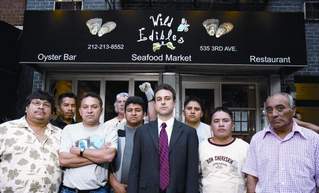
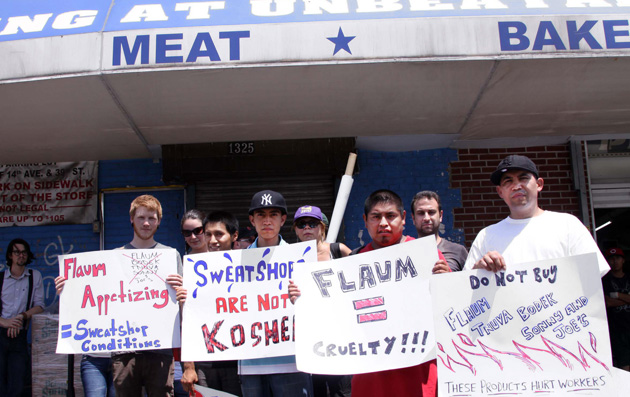
Brandworkers Defeats Anti-Speech Legal Action from the Flaum Appetizing Corp.
Workers of the Campaign for Justice at Flaum Appetizing Corporation stand up. Immigrants for Mexico and Ecuador challenged sweatshop conditions at a New York City processor and distributor of kosher foods. The workers used innovative legal advocacy and organizing tools to win justice at the company. The company Flaum Appetizing illegally withheld hundreds of thousands of dollars in compensation owed to the workers and used anti-immigrant retailiation when workers stood up for their rights.
Attorney Daniel Gross:
- Brandworkers work on a joint campaign called Focus on the Food Chain.
- Much of the food that we consume at markets and restaurants is distributed by a corridor of sweatshops that line southern Queens and northern Brooklyn.
- Overtime is hardly ever paid, no retirement benefits, no health care, extreme discrimination, extremely heavy work without appropriate health and safety standards.
- The company owes them 260 thousand in this labor board case after a full trial.
- The employer had the chance to make their case, call their witnesses, they lost. That order has been enforced, but Flaum is still resisting. They’re resisting for one reason. Immigration.
- We’ve had members there at Flaum, no question where they’re from, say no to abuse, say no to conditions where Latino workers are called cockroaches.
- It’s despicable, we need to put all our energy and all our heart into opposing this type of discrimination.
- Brandworkers: We’re very pleased to report we stared down their Taft-Hartley charges at the board.
- December 8th, 2010 at the Labor Board of Brooklyn / 2 Metro Tech Center / Brooklyn, NY /
- Focus On The Food Chain / Facebook
Guest – Daniel Gross, attorney, co-founder and executive director of Brandworkers International, a non-profit organization protecting and advancing the rights of retail and food employees.
—
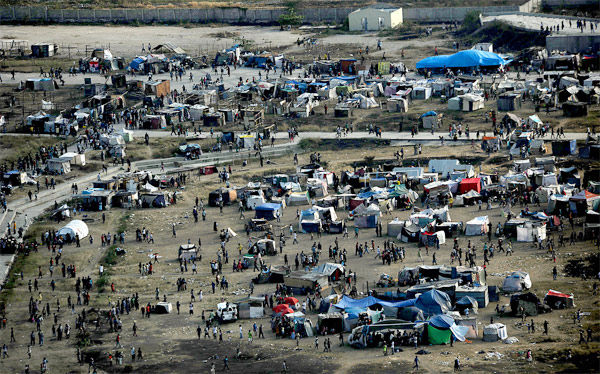
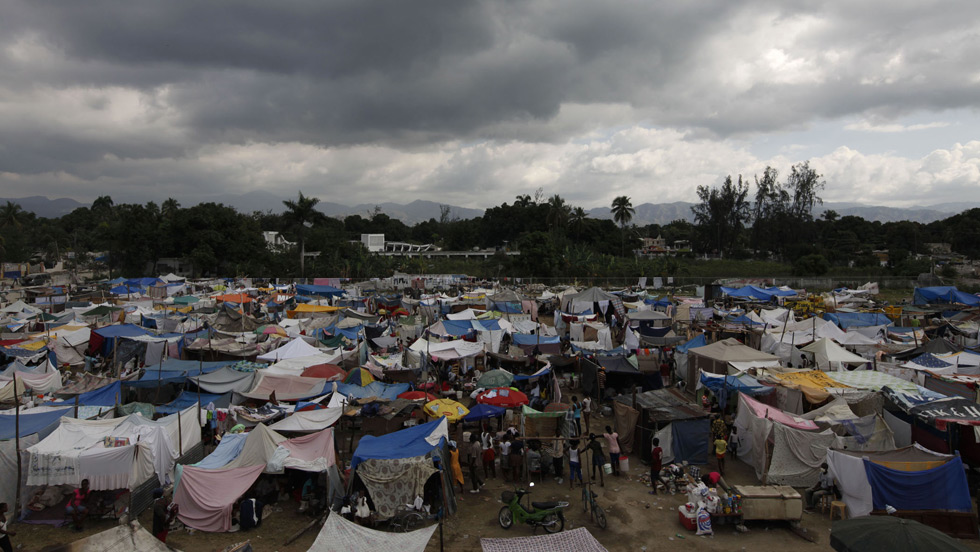
Human Rights Groups File Legal Petition on Sexual Violence Against Women and Girls in Camps for Displaced in Haiti
It’s been almost a year since Haiti’s catastrophic earthquake took the lives of nearly 200 thousand people and left 1.5 million homeless. Now, women and girls living in the camps have lived in fear of the constant threat of rape and violence.
Groups of attorneys and advocates for displaced women in Haiti are calling for urgent action to confront an epidemic of sexual violence in the camps. On-the-ground investigations have revealed a shocking pattern of rape, beatings and threats against the lives of Haitan women and girls. A petition submitted by the groups to the the Inter-American Commission on Human Rights calls for the IACHR to require the Haitian government to take action such as installing lighting in the camps and provide housing.
Bill Quigley, Legal Director of the Center for Constitutional Rights, said “The ultimate solution here is permanent, safe housing for Haitians. Unfortunately, the international community has reneged on its commitment to provide essential funds for rebuilding and the U.S., in particular, has not delivered even one cent of the reconstruction funding it pledged. Women are being forced to live in extremely unsafe conditions for the foreseeable future and it is a deplorable failure on the part of those who made such a show about standing with the Haitian people in their greatest hour of need.”
Attorney Bill Quigley:
- I was in Haiti, and visited a number of the camps with some grass roots womens’ organizations.
- I really was shocked by how terrible things were there. Still over a million people who are homeless. They’re really not camps. Every park, every school yard, every backyard, every churchyard has people living in it. Over 1300 hundred of these camps.
- None of these camps have running water or electricity or proper sanitation or food availability.
- Women and children are much more vulnerable when chaos hits.
- In one community, tens of thousands line up in the morning and afternoon just to get water. If you go to the bathroom at night, you run a real risk of being assaulted or raped.
- The Institute for Justice and Democracy in Haiti.
- They don’t want the UN to be the security down there, by and large they’re considered occupiers by the people of Haiti.
- They’re preserving order but the order is that 90 percent of the people are disenfranchised.
- Somebody with a gun or machete is empowered when all you have for protection is a plastic sheet.
- A few people can terrorize thousands and thousands of folks. Every single day is a survival day.
- Only 2 percent of the rubble has been removed.
- You can’t depend only on volunteers. Volunteers can’t build hospitals.
- The legal action filed is asking to hold the United Nations and the international community in the way the aid is being spent that is not prioritizing the safety of women and girls.
- We included in that dozens of reports of kidnapping, starving and women having to sell themselves to survive.
- I’m not sure I could live that way for a month, less than a month. Toilet facilities used by thousands of people that’s far away to get to. Mario Joseph, Haitian human rights lawyer.
- Three sources of power in Haiti, the Haitian government, the US-UN and the NGO community.
- Five cents out of every dollar actually goes to the Haitian government. Bill Clinton has more power than anybody else in Haiti.
Guest – Bill Quigley, Legal Director for the Center for Constitutional Rights, a national legal and educational organization dedicated to advancing and defending the rights guaranteed by the United States Constitution and the Universal Declaration of Human Rights. Bill joined CCR on sabbatical from his position as law professor and Director of the Law Clinic and the Gillis Long Poverty Law Center at Loyola University New Orleans. He has been an active public interest lawyer since 1977.
———————————————————————————–
——





























